2023 International Congress on Medieval Studies: Preparations
July 7, 2022 in International Congress on Medieval Studies, Kalamazoo, Uncategorized
2023 International Congress on Medieval Studies: Preparations
58th ICMS (11–13 May 2023)
To occur in a transitional ‘hybrid’ form
with Sponsored and Co-Sponsored Sessions
To be held either in person or online
(Note: Only, by special permission,
do some Sessions occur in ‘blended’ and verily ‘hybrid’ form)
Call for Papers
Proposals due by 15 September 2022
[Posted on 7 July 2022, with updates]
With the successful completion of our activities at the 2022 ICMS in May (see our 2022 International Congress on Medieval Studies Program), we begin preparations for the 2023 ICMS.
First, we thank the organizers, sponsor and co-sponsor, presiders, speakers, respondents, and participants of those activities, which included four Sessions and an Open Business Meeting. Sessions co-sponsored with the Societas Magica marked Year 18 of our co-sponsorship with that organization; one Session was co-sponsored for the first time with the Ibero-Medieval Association of North America (IMANA).
Next, we assemble proposed Sessions to be sponsored or co-sponsored for next year’s Congress. With proposals to be submitted by 1 June 2022, we would expect to hear decisions from the Congress Committee in July for sessions approved for the general Call for Papers, with a deadline for submissions of proposals for papers, via the Congress website, by 15 September.
On 1 June, the proposals were successfully submitted. We waited, hopefully, for the acceptance of these proposals. Today we learn that they are. And so, we announce them and their plans.
They are these, both sponsored and co-sponsored.
For the Congress, the listings of Sessions site the Sponsor and then any Co-Sponsor, so that finding specific Sessions among the groups of offerings on the Congress website would progress through the name of the organization, grouped primarily by the Sponsor, then the Co-Sponsor.
For information about how to propose papers for these sessions, see below. First: the sessions we prepare. Then the instructions.
I. Session Co-Sponsored with the Schoenberg Institute for Manuscript Studies
This session represents a new co-sponsorship with the Schoenberg Institute for Manuscript Studies at the Congress. The proposal is designed to continue the series of RGME Sessions at the Congress on “Medieval Writing Materials”.
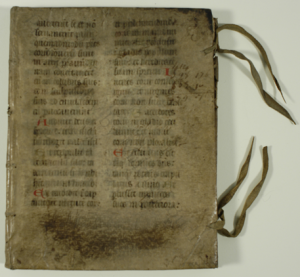
Front cover and ties of French notebook for ‘Recettes’ reusing a vellum bifolium from a medieval Latin Psalter. Photography © Mildred Budny
1. “Bound but not Gagged:
The Eloquence of Medieval Book Bindings”
Sponsor: Research Group on Manuscript Evidence
Co-sponsor: Schoenberg Institute for Manuscript Studies
Organizer: William H. Campbell (University of Pittsburgh — Greensburg) and
Co-Organizer: Mildred Budny (Research Group on Manuscript Evidence)
Modality: Online
Medieval books communicate far more than the words on their pages. They were frequently subjected to damage and repair, to loss and addition, to division and recombination. Their bindings bear witness to the moments in their history that altered and shaped them, or — in the case of still older books recycled into binding material — destroyed them. This session is dedicated to everything about the codex that is not its text, to what J. A. Szirmai called The Archaeology of Medieval Bookbinding.
[Note: On the image shown here, see our blog:
II. Sessions Co-Sponsored with the Societas Magica
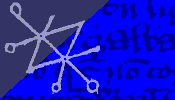
Societas Magica logo
In Year 19 of our Sessions co-sponsored with the Societas Magica, we prepare for three Sessions.
2. “Ars magica sub philosophia”?
The Rise of Learned Magic in the Late Middle Ages
Sponsor: Societas Magica
Co-sponsor: Research Group on Manuscript Evidence
Contact: Vajra Regan (University of Toronto, Centre for Medieval Studies)
(vajra.regan@mail.utoronto.ca)
Modality: In person
The Late Middle Ages saw the rise of increasingly sophisticated and intellectual forms of magic. Inevitably, this prompted a number of important thinkers to situate certain types of magic under philosophy. This session aims to bring together papers from scholars in diverse disciplines so as to better understand the various cultural, intellectual, and institutional causes responsible for the construction of medieval learned magic.
3–4. “Moving Parts and Pedagogy, Parts I–II”
Sponsor: Societas Magica
Co-Sponsor: Research Group on Manuscript Evidence
Organizer: David Porreca (University of Waterloo)
Modality: In person
Part I: Teaching Magic and Other Occult Arts
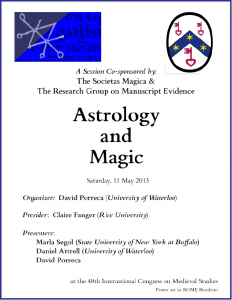
Poster for “Astrology and Magic” Congress Session (7 May 2013)
Magic, alchemy, geomancy, and other occult arts were never part of the official curriculum in any medieval university faculty. Moreover, magical treatises abound in claims of legitimacy in terms of belonging alongside other more overtly recognized sciences. Nevertheless, the abundance of surviving treatises, manuals, and commentaries suggests that there must have been some means outside the bounds of officially recognized institutions for these bodies of knowledge and practices to have been taught, learned, and transmitted, despite the negative light often cast upon them in ‘mainstream’ circles. This session aims to investigate the pedagogy of such arts and practices.
Part II: Teaching Astrology and other Liberal Arts
During the later Middle Ages, astrology began to play an ever more prominent role in university curricula. It was frequently merged with astronomy as one of the Seven Liberal Arts, and it became required knowledge for the practice of medicine. These developments created a need for new masters capable of rendering its intricacies intelligible to the next generation of doctors and other practitioners. This session aims to examine how the pedagogy of astrology functioned, and how the teaching of that discipline fits alongside the rest of the Liberal Arts curriculum.
III: Session Co-Sponsored with Polytheism-Oriented Medievalists of North America (P.-O.M.o.N.A.)
This session would be the second (non-consecutive) year of co-sponsorship with this organization.
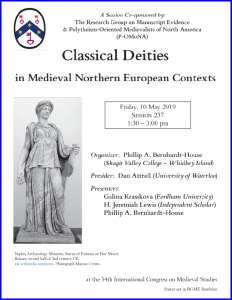
Pomona Session Kzoo 2019
5) “Words as Agents”
Sponsor: Research Group on Manuscript Evidence
Co-sponsor: Polytheism-Oriented Medievalists of North America (P-OMoNA)
Organizer: Phillip Bernhardt-House
Co-Organizer: Mildred Budny
Modality: Online
The idea of words as agents of specific actions, changes of status, or as means via which changes occur in the wider world is inherent in many forms of literate and verbal communication, underlying human social phenomena as diverse as legal systems, religious community formation and practices, and the practice of magic, amongst others. Textual amulets, deeds, dedicatory inscriptions, and other written matter (even entire alphabets!) can convey notions of words’ agency.
This session explores a variety of these, reflected in specific examples from pre-modern periods and cultures, from the Iron Age to the Renaissance and across wide geographic ranges.
*****
Watch this space for developments in the progress of preparations for the 2023 Congress.
Presenting Submissions for Papers
You can submit your proposal for any one of these Sessions on the official Congress website through its submission portal. The deadline for proposals is before or by 15 September 2022. Then the choice of the program for each Session, with the Presenters and the Presider, will be submitted to the Congress Committee by 1 October 2022.
According to the Congress website (as of 20 July 2022):
A full list of all sessions of papers and roundtables (including their delivery modalities) can be viewed on our website (wmich.edu/
You are welcome to correspond with potential session participants through other channels, but an official proposal can only be made and accepted through the Confex proposal portal (icms.confex.com/icms/2023/
This portal is also linked from our website. The deadline for submission is Thursday, Sept. 15.
2023 Congress Sessions
We hope for strong responses to the Call for Papers, in a suite of sessions co-sponsored by the Research Group, in accordance with our many years of participation in the Congress, both in person and online. That tradition is described in our ‘archive’ of Events and Congress Sessions.
- Congress Activities
- Sponsored Sessions at the International Congress on Medieval Studies
- Co-Sponsored Sessions at the International Congress on Medieval Studies
Our tradition includes the publication of Abstracts, as their authors allow, for the Papers and Responses of Sessions sponsored and co-sponsored by the RGME.
As they appear, you may find individual Abstracts by Name and/or by Year of Presentation in our Lists of
*****
Post Script:
The Stories that Bindings Can Tell
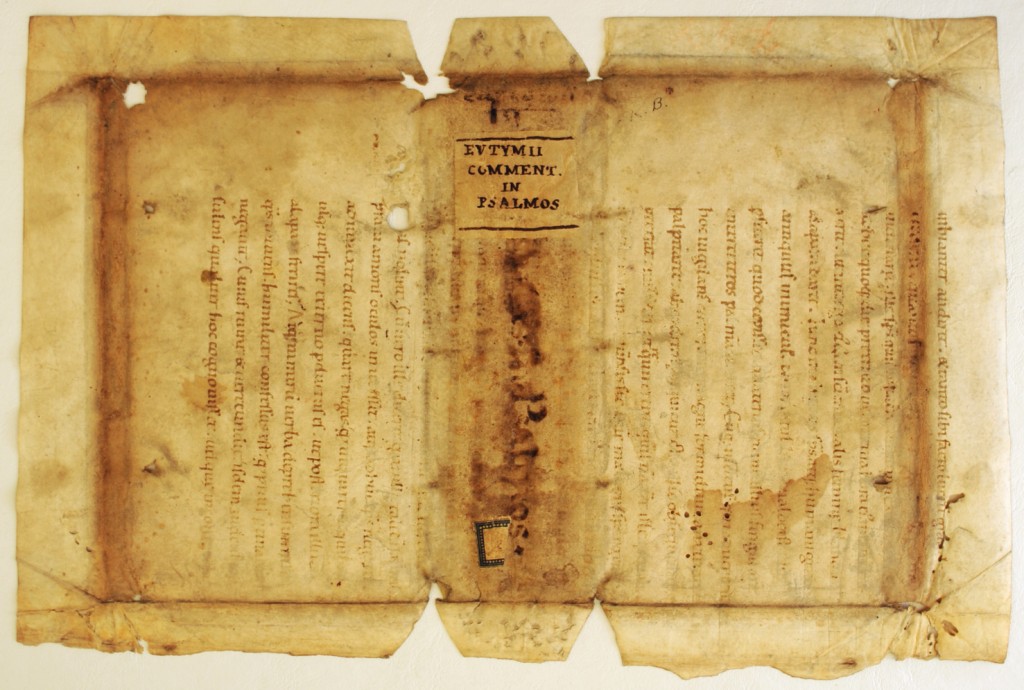
Reused Bifolium, Verso, turned Sideways, as the Cover for a missing volume of Euthymius on the Psalms. Photography Mildred Budny.
[Note: For information about this image, see our blog:
More stories to tell. Watch this space!
*****
